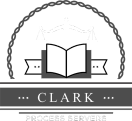"Service of process" is the procedure by which a party to a lawsuit gives an appropriate notice of initial legal action to another party (such as a defendant), court, or administrative body in an effort to exercise jurisdiction over that person so as to enable that person to respond to the proceeding before the court, body, or other tribunal. Clark Process Servers – Stockton Process Server is here to help handle your Process serving needs.
Notice is furnished by delivering a set of court documents (called "process") to the person to be served.
Each jurisdiction has rules regarding the appropriate service of process. Typically, a summons and other related documents must be served upon the defendant personally, or in some cases upon another person of suitable age and discretion at the person's residence or place of business or employment. In some cases, service of process may be effected through the mail as in some small claims court procedures. Locating and delivering paperwork can be very frustrating. Clark Process Servers – Stockton Process Server is here to help handle your Process server needs.
Proper service of process initially establishes personal jurisdiction of the court over the person served. If the defendant ignores further pleadings or fails to participate in the proceedings, then the court or administrative body may find the defendant in default and award relief to the claimant, petitioner or plaintiff. The defendant may contest the default in his or her home state. Service of process must be distinguished from service of subsequent documents (such as pleadings and motion papers) between the parties to the litigation.
Personal service by Clark Process Servers – Stockton Process Server
Personal service is service of process directly to the (or a) party named on the summons, complaint, or petition. Most states allow substituted service in almost all lawsuits unless a corporation, LLC, LLP, or other business entity is being served; in those cases, personal service must be achieved by serving (in hand) the documents to the "registered agent" of a business entity. If the individual refuses to accept service, flees, closes the door, etc., and the individual has been positively identified as the person to be served, the documents may be "drop served" (placed as close to the individual as possible); this is considered a valid service. In the U.S., personal service of process has been the hallmark for initiating litigation for nearly 100 years, primarily because it guarantees actual notice to a defendant of a legal action against him or her. Contact Clark Process Servers today to handle your Process Serving correctly.
Return of service
Once service of process has been effected, Clark Process Servers typically file a return of service or proof of service or affidavit of service with the court (or convey one to the plaintiff to file with the court). The return of service indicates the time and place at which service was effected, the person served, and any additional information needed to establish that service was properly made. It is signed by the process server, and operates as evidence that service of process was effectively made.


